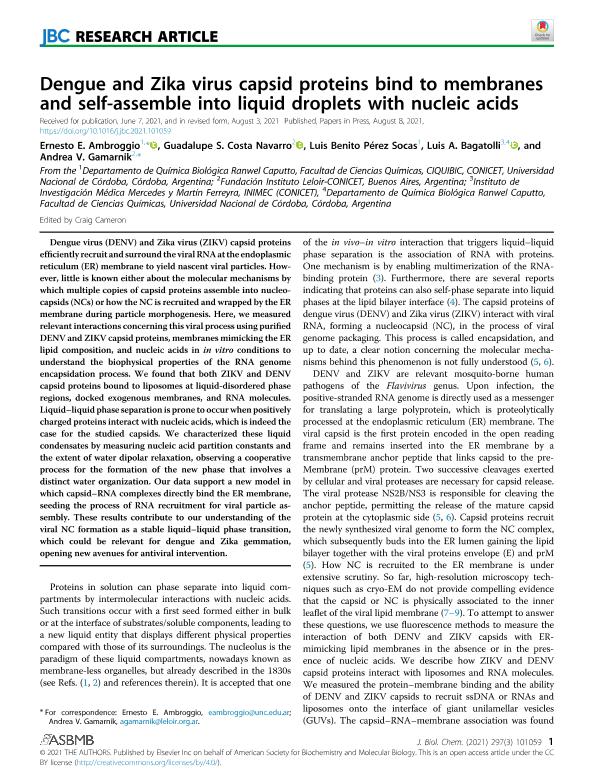Artículo
Dengue and Zika virus capsid proteins bind to membranes and self-assemble into liquid droplets with nucleic acids
Ambroggio, Ernesto Esteban ; Costa Navarro, Guadalupe Soledad
; Costa Navarro, Guadalupe Soledad ; Pérez Socas, Luis Benito
; Pérez Socas, Luis Benito ; Bagatolli, Luis Alberto
; Bagatolli, Luis Alberto ; Gamarnik, Andrea Vanesa
; Gamarnik, Andrea Vanesa
 ; Costa Navarro, Guadalupe Soledad
; Costa Navarro, Guadalupe Soledad ; Pérez Socas, Luis Benito
; Pérez Socas, Luis Benito ; Bagatolli, Luis Alberto
; Bagatolli, Luis Alberto ; Gamarnik, Andrea Vanesa
; Gamarnik, Andrea Vanesa
Fecha de publicación:
09/2021
Editorial:
American Society for Biochemistry and Molecular Biology
Revista:
Journal of Biological Chemistry (online)
ISSN:
0021-9258
e-ISSN:
1083-351X
Idioma:
Inglés
Tipo de recurso:
Artículo publicado
Clasificación temática:
Resumen
Dengue virus (DENV) and Zika virus (ZIKV) capsid proteins efficiently recruit and surround the viral RNA at the endoplasmic reticulum (ER) membrane to yield nascent viral particles. However, little is known either about the molecular mechanisms by which multiple copies of capsid proteins assemble into nucleocapsids (NCs) or how the NC is recruited and wrapped by the ER membrane during particle morphogenesis. Here, we measured relevant interactions concerning this viral process using purified DENV and ZIKV capsid proteins, membranes mimicking the ER lipid composition, and nucleic acids in in vitro conditions to understand the biophysical properties of the RNA genome encapsidation process. We found that both ZIKV and DENV capsid proteins bound to liposomes at liquid-disordered phase regions, docked exogenous membranes, and RNA molecules. Liquid–liquid phase separation is prone to occur when positively charged proteins interact with nucleic acids, which is indeed the case for the studied capsids. We characterized these liquid condensates by measuring nucleic acid partition constants and the extent of water dipolar relaxation, observing a cooperative process for the formation of the new phase that involves a distinct water organization. Our data support a new model in which capsid–RNA complexes directly bind the ER membrane, seeding the process of RNA recruitment for viral particle assembly. These results contribute to our understanding of the viral NC formation as a stable liquid–liquid phase transition, which could be relevant for dengue and Zika gemmation, opening new avenues for antiviral intervention.
Archivos asociados
Licencia
Identificadores
Colecciones
Articulos(CIQUIBIC)
Articulos de CENTRO DE INVEST.EN QCA.BIOL.DE CORDOBA (P)
Articulos de CENTRO DE INVEST.EN QCA.BIOL.DE CORDOBA (P)
Citación
Ambroggio, Ernesto Esteban; Costa Navarro, Guadalupe Soledad; Pérez Socas, Luis Benito; Bagatolli, Luis Alberto; Gamarnik, Andrea Vanesa; Dengue and Zika virus capsid proteins bind to membranes and self-assemble into liquid droplets with nucleic acids; American Society for Biochemistry and Molecular Biology; Journal of Biological Chemistry (online); 297; 3; 9-2021; 1-11
Compartir
Altmétricas



